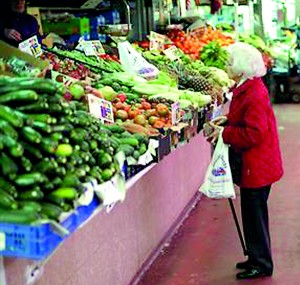Sunday Times 2
Eating vegetables and fruit tied to longer life
View(s):NEW YORK (Reuters Health) – Eating fewer than five servings of fruit and vegetables each day is linked with a higher chance of dying early, according to a large study from Sweden.
People who said they never ate fruit and vegetables died an average of three years sooner than those who ate plenty of apples, carrots and tomatoes, researchers found.
Many public health organizations worldwide recommend eating five servings of fruit and vegetables a day, but previous studies have been inconclusive on whether meeting that guideline helps improve health and by how much, researchers said.

A woman looks at fruits and vegetables at a market stall in Madrid (REUTERS)
The new study, published in the American Journal of Clinical Nutrition, shows the five-a-day recommendations are optimal, said Alicja Wolk, who worked on the research at the Karolinska Institute in Stockholm.
Her team did not find any improvement in survival for people who ate more than five servings of fruit and vegetables each day, compared to those who just met the guideline.
The results are based on data collected from more than 71,000 Swedes, aged 45 to 83, who were followed for 13 years.
Participants were surveyed about their diets in 1997 and 1998 and reported how often they ate fruit – including oranges, apples, bananas and berries – and vegetables, such as carrots, beets, lettuce, cabbage, tomatoes and pea soup.
Nearly 11,500 of those enrolled had died by December 2010.
Wolk’s team found that people who had reported eating no fruit or vegetables at the start of the study were 53 percent more likely to die during the follow-up period than those who got their five daily servings.
Participants who ate at least one serving of fruit daily lived 19 months longer than those who never ate fruit, on average. And those who ate at least three servings of vegetables per day lived 32 months longer than people who reported not eating vegetables.
Fruits and vegetables contain different types of vitamins, and fruit is generally higher in calories, Wolk noted.
Most diet discussions consider them as a combined group, she told Reuters Health. “But when I speak to lay people I actually say, ‘Eat vegetables more than fruit, but eat both.’”
Women in the study tended to eat more fruit and vegetables than men.
People who said they ate fewer fruits and vegetables were more likely to smoke and tended to be less educated and eat more red meat, high-fat dairy products, sweets and snacks. On the other hand, those who ate a lot of fruit and vegetables tended to take in more calories per day overall than those who did not, Wolk noted.
Follow @timesonlinelk
comments powered by Disqus

